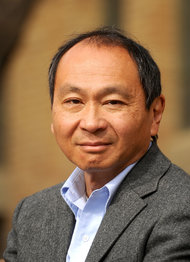By QITONG CAO MAY 1, 2015 4:18 AM May 1, 2015 4:18 am
Francis Fukuyama’s widely read essay “The End of History?” — published just before the fall of the Berlin Wall in 1989 — posited that Western liberal democracy may turn out to be the endpoint of political development. So when Mr. Fukuyama laid out what he considered the weaknesses of the American political system in a new book last year, “Political Order and Political Decay,” the Chinese state news media immediately asserted that he had altered his views and now considered state capacity, like that of China during the last 35 years of rapid economic development under Communist Party rule, as more important for a country’s prosperity than democracy.
 Francis Fukuyama.Credit Noah Berger for The New York Times
Francis Fukuyama.Credit Noah Berger for The New York Times
But Mr. Fukuyama, a political scientist at Stanford University, responded that this was a misreading. “My argument is that an effective political system has to balance state capacity against rule of law and democracy,” he said last November. “I think in the United States and certain other democratic countries, the emphasis has been so much on the constraint of state power that we end up not being able to make difficult decisions. But I think China is the opposite, and that’s not a good situation either.”
In an interview last month, he discussed what China’s past and present portend for its future political development:
Q.
China plays a major role in your last two books, “The Origins of Political Order” and “Political Order and Political Decay.” Why?
A.
China really invented modern bureaucracy at the time of the Qin and Han dynasties, with relatively impersonal forms of official selections and bureaucratic rules. But for me, there’s a big empirical question: You can see certain similarities between those traditions in ancient China and the system that governs China today, but I think we know relatively little empirically about how the Chinese government works.
For example, a lot of people will assert that China is more meritocratic [than Western countries], but we don’t actually know that because we don’t have good empirical measures of to what extent Chinese bureaucrats are promoted on the basis of merit, or to what extent on personal connections, guanxi, political reliability. So we need to figure out a way of trying to understand that.
Also, China is such a big place. I think that different regions, different levels of government, different ministries all have different characteristics. So we need to understand better what some of those differences are. For example, a lot of people in China believe that corruption is much more prevalent in low levels of government and that higher levels of government are better. But I don’t think there’s any evidence to show that’s true.
Q.
You write that China has not had the rule of law because there has never been an overarching religious power in the Chinese state. But you also say that political institutions may evolve. So what is the significance of historical traditions?
A.
In India, Europe and the Middle East, you had this tradition of an independent judiciary based on a religious institution, and what happened in Europe is that that institution eventually became secular and part of the state, but not part of the executive branch. So there’s a very deep tradition of having independent judges and legal systems and so forth, and I think that was really critical to the development of the rule of law in Europe.
But that doesn’t mean that’s the only way that the rule of law can develop. For example, the rule of law is also important for commercial purposes. If you don’t have property rights, arbitration, contract enforcement and dispute resolution, you’re just not going to be able to create a modern economy. So there are a lot of functional reasons why you’d want the rule of law in China. Part of the process of entering the W.T.O. was creating legal institutions that would allow Chinese firms to interact with international firms and so forth. So there has been a buildup of commercial law.
Yet the real absence of law, I think, is not at that level. It’s more at the level of the party, at the higher authorities that don’t necessarily feel bound by the same laws. They see that it’s useful to have these laws, but they don’t feel bound by them necessarily. If they want to change the rules to suit themselves, they can do it.
I think that this is going to be really critical in rules that have to do with succession and term limits. One of the things that I think has made the current Chinese leadership exceptional among authoritarian regimes is the fact that there are term limits. You have these three turnovers of leadership on 10-year intervals. You have retirement, a somewhat mandatory retirement age and so forth. Most dictatorships don’t do this. I mean, Qaddafi hung on for, like, 42 years.
But the problem is that that’s not a constitutionally embedded rule. This is just a kind of understanding among the senior leadership, and it’s something that could, in the end, fall by the wayside. [Editor’s note: The Chinese Constitution stipulates that the president, as the symbolic head of state, shall serve no more than two consecutive terms of five years each. However, no constitutional limits apply to the general secretary of the Communist Party or to the chairman of the state or party Central Military Commissions.]
